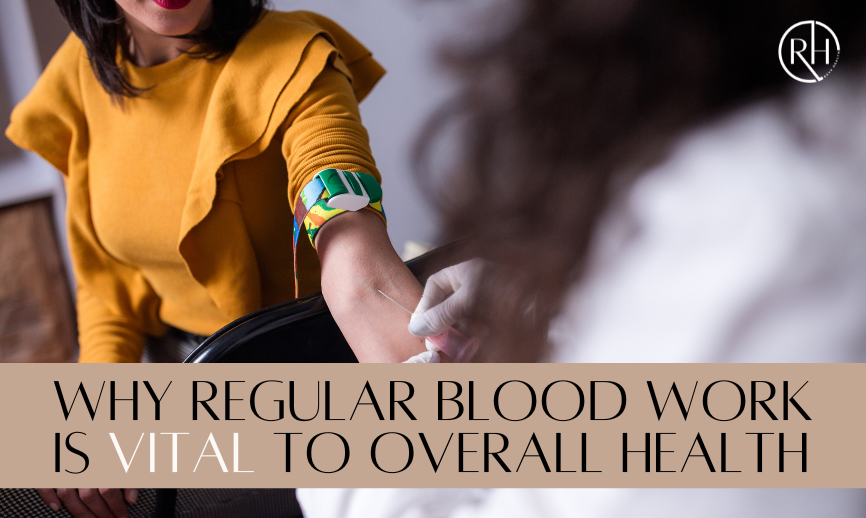Almost everyone who has been to the doctor’s office for a physical exam has also experienced having additional “lab work” done, including a blood test. Often, people do not give these tests much thought, leaving all the details to their doctors. One of the few things people will learn from their blood work is their cholesterol levels. Sometimes that is the only thing that gets attention. But the fact is, blood tests reveal a much broader picture of a patient’s health.
If you were to look at your bloodwork results, you would see a host of measured parameters, often going on for four or more pages, depending on what tests were ordered. That is another thing you should know: sometimes your doctor does not order a comprehensive panel. Instead, doctors often order a limited test to measure only specific health parameters. Unless information obtained during your exam or your overall health history indicates that some other items should be measured, some things may be skipped.
So what, exactly, is your doctor looking for? Most doctors just focus on outliers–numbers indicating that something is seriously “off” in one way or another. Otherwise, if the numbers are within “acceptable” levels, chances are, you will not hear much about the blood test results.
What Can Blood Tests Determine?
There are many different tests that can be administered for your blood.
The most basic test is called a complete blood count, or CBC. This test will look at the number of red blood cells, white blood cells, platelets, hemoglobin, and hematocrit. Depending upon the numbers, this test can indicate if an individual has nutritional or iron deficiencies, an infection, immune disorders, or even blood cancer.
A metabolic panel can measure the presence of different compounds in the blood. A doctor may order only a basic metabolic panel or a comprehensive metabolic panel. Again, depending upon the results, the test may indicate problems such as diabetes, kidney disease, liver disease, hormonal imbalance, and other diseases or syndromes.
The lipid panel will measure cholesterol levels, indicating the likelihood of developing heart problems.
In addition to these tests, other panels may include a thyroid panel, an enzyme test, a test for certain types of infections, a coagulation panel, a DHEA sulfate-serum test, and a C-reactive protein test. Again, whether your doctor orders any or all of these blood tests will depend primarily on what your doctor is looking for. The test may be based upon what you may have indicated about how you feel, symptoms you have experienced, or what you have been exposed to. For example, if you think you may have contracted a sexually transmitted disease, your doctor may order a blood test that looks specifically for the marker that indicates the presence of STDs.
If I Don’t Have a Disease, Why Should I Care?
Blood tests clearly reveal a great deal about your overall health. But if your doctor is not worried about anything indicated by your blood tests, why should you?
It’s a fair question, but the answer is fundamental. Your doctor’s purpose in ordering a blood test is to determine if there are glaring problems. So long as the numbers stay within the given “normal ranges” for a person of your sex and age, your doctor will probably not pay much attention to many of the numbers other than maybe telling you to get more exercise, eat a healthier diet, or lose some weight. Or, your doctor may say that some of the numbers are too high or too low, and maybe you should consider taking some medication.
Alternatively, suppose there is an outlier that indicates the presence of a disease or other serious health condition. In that case, your doctor will inform you of the problem, and likely order more tests and start you on some course of treatment.
But is all of that the same as achieving your best health?
Don’t Settle for Okay: Aim for Optimal
Your personal goal should not just be to avoid getting sick. Instead, it should be to take active steps to optimize your health. It means that falling within the “normal range” for a person your age is insufficient. You should aim to achieve the best health condition possible, where all your health indicators are in balance and harmony. It means that when you have a blood test done, you should scrutinize it to investigate what your numbers are, versus what they ought to be. If they do not indicate that you are in your best health, you need to take the steps necessary to achieve them.
This idea defines the purpose of REVV. When your body’s chemistry is in perfect balance, you will not only feel better physically, but your mood, attitude, and mental clarity will be at their peak, not adversely affected by physiological factors.
Our Licensed Naturopath Doctor Digs Deeper
At REVV Health, our N.D. will closely examine your bloodwork to assess your levels in the context of your symptoms. In other words, our doctor is not only examining where your levels fall within that “normal” range, but why they’re where they are.
The truth is, we do not always listen well to what our bodies tell us about our health. At REVV, our mission is to craft a regimen tailored specifically to you that provides you with concrete, measurable steps that will make you feel better. More than that, these steps will help you preserve good health over the long run, helping you avoid serious health problems.
We can’t lead you to the fountain of youth. But as you grow older, we can help you be your best, feeling younger than your years suggest. To find out more about how our health services can bring your body and mind into balance, contact REVV today.


